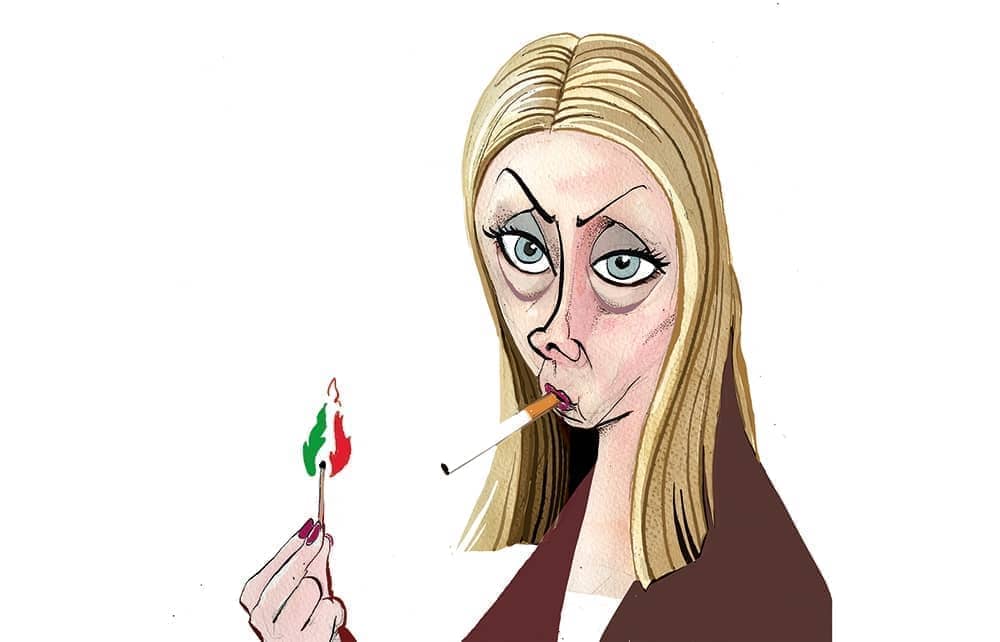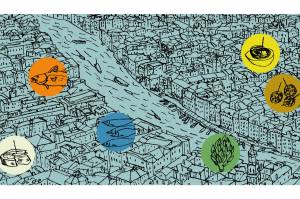One is a blonde, photogenic woman who grew out of a youthful infatuation with Benito Mussolini to become the first female prime minister of Italy. The other is anything but photogenic, a grizzled veteran of more than three decades of political combat, who began his career as a student activist and became a respectable center-right statesman, only to reinvent himself as a populist firebrand. But if you were to judge Giorgia Meloni and Hungarian Prime Minister Viktor Orbán by the frequency with which they appear together in media coverage, usually with adjectives like “far-right” and “extreme” attached, you might assume that the two conservative heads-of-state are basically indistinguishable.
The European Union and its assorted sympathizers certainly seem to think so. Academics and headline writers have almost uniformly described Meloni as a right-wing extremist and Orbán copycat. Just before the Italian election, European Commission President Ursula von der Leyen darkly warned that the EU had “tools” to use if the electorate voted for Meloni’s coalition, a none-too-subtle reference to the bloc’s ongoing punitive measures aimed at conservative governments in Poland and Hungary.
In truth, Meloni and Orbán’s recent political successes owe as much to idiosyncratic local factors as any grand transnational movement of conservative populists. Yet the breathless coverage of both figures, who are typically portrayed as allies or ideological confederates, ignores their unique political features.
Orbán, a canny veteran of Hungarian politics, represents continuity for a country that enjoyed steady economic growth before Covid and the Russian invasion of Ukraine. In the April parliamentary elections, he decisively beat Péter Márki-Zay, a small-town mayor whose campaign was plagued by a series of gaffes. Despite his ideological provocations in the Western press, Orbán appealed to risk-averse voters seeking reassurance in the wake of a global pandemic and the sudden outbreak of war on Hungary’s eastern border.
By becoming the most conservative Italian prime minister since World War II, Meloni signifies a dramatic shift in her country’s political trajectory. Since the turn of the millennium, Italy has endured economic stagnation and a revolving door of governing coalitions. Meloni’s prime ministership may prove short-lived, but her victory suggests that Italian voters are fed up with the status quo.
The economic outlook of the two leaders’ voters also differ considerably. Fidesz, Hungary’s ruling conservative party, draws its electoral strength from the country’s poorer, rural counties. Meloni’s Brothers of Italy, meanwhile, won considerable support from anti-welfare voters. The new ruling coalition will also inherit the economic resentments of prosperous Northern Italy, which has long complained about the burden of subsidizing the country’s poorer southern regions. In Hungary, it is liberal Budapest that contributes a disproportionate share of taxes and economic productivity while the rural counties rely on government largesse.
Beyond their biographies and political coalitions, Orbán and Meloni also have distinctly local factors to thank for their recent victories. The Brothers of Italy were able to capitalize on an obscure dispute over long-standing rentals of Italy’s valuable (and nationally owned) beachfront coastline, an issue that is almost completely inscrutable to outsiders. Orbán benefited from running against Márki-Zay, a relative novice at the head of an unwieldy political coalition that encompassed the extreme left and far-right of Hungarian politics. In many European countries, Orbán’s past overtures to Vladimir Putin would have been a major political liability. In Hungary, this vulnerability was mitigated by the presence of a substantial Hungarian minority in Southeastern Ukraine with grievances against the national government.
Over the past decade, critics have warned of an emerging bloc of conservative populists who collaborate across borders and harbor retrograde nationalist and anti-democratic sentiments. Recent events have revealed this to be an illusory threat. Meloni’s victory is a consequence of distinctly Italian conditions. Her political survival will depend not on Orbán, but her ability to manage Italy’s tenuous post-pandemic recovery and looming debt crisis. Elsewhere in Europe, Orbán and Poland’s ruling Law and Justice Party, long considered close allies, have split acrimoniously over the Russian invasion of Ukraine. Poland, which borders the Russian semi-exclave of Kaliningrad and the Russian client state of Belarus, is much more sensitive to Vladimir Putin’s revanchist ambitions than Hungary, safely tucked behind a Ukrainian buffer state.
Orbán, Meloni, and conservative populists from Sweden to Poland do have one thing in common. Their message, often couched in terms of local issues and resentments, resonates with large numbers of voters, despite persistent claims that the issues they raise have been manufactured by Russian troll farms, social media agitators, and assorted other scapegoats and provocateurs. Economic anxiety, suspicion of mass migration, resurgent nationalism, and Euroscepticism will continue to drive voters toward populist and conservative alternatives. Until these voters are satisfied that their concerns have been addressed, there will be more Orbáns and Melonis for the EU to contend with.


















